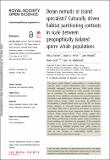Files in this item
Ocean nomads or island specialists? Culturally driven habitat partitioning contrasts in scale between geographically isolated sperm whale populations
Item metadata
| dc.contributor.author | Vachon, Felicia | |
| dc.contributor.author | Hersh, Taylor A. | |
| dc.contributor.author | Rendell, Luke | |
| dc.contributor.author | Gero, Shane | |
| dc.contributor.author | Whitehead, Hal | |
| dc.date.accessioned | 2022-05-20T09:30:19Z | |
| dc.date.available | 2022-05-20T09:30:19Z | |
| dc.date.issued | 2022-05-18 | |
| dc.identifier | 279664721 | |
| dc.identifier | b74e97c6-b776-4e4e-9e3d-d513cb53f996 | |
| dc.identifier | 85131133569 | |
| dc.identifier | 000905793400006 | |
| dc.identifier.citation | Vachon , F , Hersh , T A , Rendell , L , Gero , S & Whitehead , H 2022 , ' Ocean nomads or island specialists? Culturally driven habitat partitioning contrasts in scale between geographically isolated sperm whale populations ' , Royal Society Open Science , vol. 9 , no. 5 , 211737 . https://doi.org/10.1098/rsos.211737 | en |
| dc.identifier.issn | 2054-5703 | |
| dc.identifier.other | Jisc: 325377 | |
| dc.identifier.other | publisher-id: rsos211737 | |
| dc.identifier.other | ORCID: /0000-0002-1121-9142/work/113398830 | |
| dc.identifier.uri | https://hdl.handle.net/10023/25424 | |
| dc.description | Funding: This research was funded by the National Geographic Society (grant no. NGS-62320R-19-2), the Agoa Sanctuary, the Natural Sciences and Engineering Research Council of Canada and the Animal Behavior Society. | en |
| dc.description.abstract | The sperm whale (Physeter macrocephalus) is a deep-diving cetacean with a global distribution and a multi-leveled, culturally segregated, social structure. While sperm whales have previously been described as ‘ocean nomads’, this might not be universal. We conducted surveys of sperm whales along the Lesser Antilles to document the acoustic repertoires, movements and distributions of Eastern Caribbean (EC) sperm whale cultural groups (called vocal clans). In addition to documenting a potential third vocal clan in the EC, we found strong evidence of fine-scale habitat partitioning between vocal clans with scales of horizontal movements an order of magnitude smaller than from comparable studies on Eastern Tropical Pacific sperm whales. These results suggest that sperm whales can display cultural ecological specialization and habitat partitioning on flexible spatial scales according to local conditions and broadens our perception of the ecological flexibility of the species. This study highlights the importance of incorporating multiple temporal and spatial scales to understand the impact of culture on ecological adaptability, as well as the dangers of extrapolating results across geographical areas and cultural groups. | |
| dc.format.extent | 13 | |
| dc.format.extent | 828325 | |
| dc.language.iso | eng | |
| dc.relation.ispartof | Royal Society Open Science | en |
| dc.subject | Organismal and evolutionary biology | en |
| dc.subject | Culture | en |
| dc.subject | Population structure | en |
| dc.subject | Sperm whale | en |
| dc.subject | Cultural segregation | en |
| dc.subject | Distribution | en |
| dc.subject | Scale | en |
| dc.subject | QL Zoology | en |
| dc.subject | GC Oceanography | en |
| dc.subject | DAS | en |
| dc.subject | MCC | en |
| dc.subject.lcc | QL | en |
| dc.subject.lcc | GC | en |
| dc.title | Ocean nomads or island specialists? Culturally driven habitat partitioning contrasts in scale between geographically isolated sperm whale populations | en |
| dc.type | Journal article | en |
| dc.contributor.institution | University of St Andrews. School of Biology | en |
| dc.contributor.institution | University of St Andrews. Centre for Social Learning & Cognitive Evolution | en |
| dc.contributor.institution | University of St Andrews. Centre for Biological Diversity | en |
| dc.contributor.institution | University of St Andrews. Sea Mammal Research Unit | en |
| dc.contributor.institution | University of St Andrews. Institute of Behavioural and Neural Sciences | en |
| dc.contributor.institution | University of St Andrews. Bioacoustics group | en |
| dc.contributor.institution | University of St Andrews. Marine Alliance for Science & Technology Scotland | en |
| dc.identifier.doi | 10.1098/rsos.211737 | |
| dc.description.status | Peer reviewed | en |
This item appears in the following Collection(s)
Items in the St Andrews Research Repository are protected by copyright, with all rights reserved, unless otherwise indicated.

